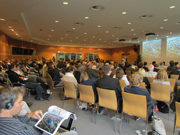What’s next for the Léman Region

The second Et Maintenant? forum held at UNI Global head office attracted around two hundred people from the region eager to debate the opportunities and risks created by the Léman Region’s soaring growth rate.
The Forum was opened by Philip Jennings, General Secretary of UNI Global Union who co-organised the event along with Daniel Rosselat, the Mayor of Nyon, and Stéphane Benoît-Godet, the Editor-in-Chief of Bilan.
The debate was preceded by a presentation of the key figures by Pierre Dessermontet, the founder of the MicroGIS Institute which underlined the challenges ahead with 1.3 million people expected to be shoe-horned into the region between the Jura Mountains and Lac Léman by 2030.
Daniel Rosselat recognised that the authorities had a responsibility to develop an economic development plan which takes into account legitimate concerns about lack of affordable housing, transport problems and the need to find environmentally sustainable solutions. The concerns are real and immediate – by the end of this decade alone there will be an additional 100,000 people living in the region adding pressure to resources.
Political views on the future of the region were voiced by François Longchamp, State Counsellor of the Republic and the Canton of Geneva and Antoine Vielliard, Municipal Counsellor for Saint-Julien-en-Genevois. Vielliard made the point that an economic/political solution had to put the well-being of each inhabitant at the centre of the debate rather than focusing on the concept of growth in the abstract. Longchamp said that it was important to consider the whole region when discussing how to manage growth. Geneva was key, as was its relation with neighbouring France.
Devandra Rana, WWF and Cyriaque Sendashonga, UICN widened the debate – adding a global dimension. They said the question the region should be asking was what is the best form of development for each person and the planet? It was about coming up with a development plan that balanced social, economic and environment concerns correctly, rather than opposing Man against Nature. Their message was that it was not a zero-sum game with only winners and losers and a holistic approach would pay dividends. The region was economically, naturally and intellectually powerful and should take the responsibility to use that power responsibly and ensure growth was sustainable.
Lisa Thorsen from Copenhagen and Reindert Hoek from Utrecht gave concrete examples on how visionary development master-plans can work. Both cities have similar challenges to those facing the Léman Region. They have been transformed by vast modern housing projects and environmentally inspired transport plans which have prioritised green solutions, notably public transport and bikes! What both speakers made clear was that these cities had invested large sums of public money through high taxes as well as finding innovative ways to incorporate private funding.
UNI General Secretary Philip Jennings said, “What they have achieved in Copenhagen and Utrecht shows that where there’s a will there's a way. We in Nyon and the rest of Léman region can take inspiration. We saw how engaged the people in the region are. They came in their droves to the Et Maintenant event. They want answers. They want leadership.”
The Forum closed with a passionate debate about the role of multinationals in developing the region. The speakers included Frédérique Reeb-Landry, Director General of Proctor and Gamble, Jennifer Ackermann from UNIA and Daniel Rossellat. Ackermann made a plea for more to be done to create affordable crèche places for pre-school children to allow parents to work. Reeb-Landry defended the role of multinationals in promoting training and jobs in the region. Rossellat rounded off the discussion by outlining the complexity of the problems and the need for more consultation.
However, what resonated with the public was the final intervention from Copenhagen’s Lise Thorsen. She said at the heart of the problem was that none of the speakers in the room had the appetite for the higher taxes which would be necessary to bankroll a new master-plan for the region. Thorsen said that was a problem that the authorities and the people of the Léman Region would have to work out for themselves.

